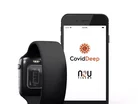NeuTigers: edge AI in healthcare

What is edge AI?
Edge AI is essentially a combination of edge computing and artificial intelligence. Algorithms are processed locally - directly on a mobile device or server - rather than in the cloud. This reduces cost, computing power and energy requirements. There are also claims that edge AI is so fast it is possible to reach near real-time analytics.
Edge AI devices include smart speakers, smart phones, laptops, robots, self-driven cars, drones, and surveillance cameras that use video analytics.
Who is NeuTigers?
NeuTigers is a spin-off company from Princeton University, formed in 2018 to apply edge AI and machine learning to solve challenges in healthcare, energy, productivity, and security.
With offices in Princeton, NJ, the company is based at one of the top AI accelerator programs of FutureLabs in New York, and has also established a subsidiary in Nice, France.
How is NeuTigers applying edge AI to healthcare?
The NeuTigers AI Technology Stack uses deep neural networks that mimic how the human brain perceives and interprets the world. The company has developed the StarDeepTM Smart Health Platform for health monitoring and biomedical imaging, to improve the accuracy and speed of diagnosing diseases.
NeuTigers say the platform has the potential to monitor and screen for thousands of conditions, when used in combination with medical devices and smart sensors already deployed in healthcare settings.
Are there any real world examples?
In January NeuTigers launched CovidDeep, a tool that predicts COVID-19 with more than 90% accuracy, using physiological data from a wristband along with blood pressure and blood oxygen readings. It then analyses the data and gives a prediction within two minutes.
This week NeuTigers announced a new study to detect the early signs of complications with sickle cell anaemia. Conducted at a hospital in Paris, the research will begin by looking at changes to skin response, heart beat, sleep and temperature to predict an acute episode of sickle cell anaemia, and how this impacts on the patients’ disease conditions and quality of life.
The second phase of the project is to expand with prospective studies across different sites in EU, Africa and the US to explore the models' accuracy and clinical effectiveness.
They say...
Adel Laoui, CEO and founder of NeuTigers, says: “The best way to deal with a crisis is to avoid it happening in the first place. We are now entering a new era where medical early warning systems have become a reality.
“We are excited at the possibility of deploying a technology that can save lives of patients dealing with sickle cell anaemia. The potential of the StarDeep platform to dramatically improve patient outcomes while slashing some of the highest costs of healthcare makes it one of the most exciting developments in preventative personal medicine.”



